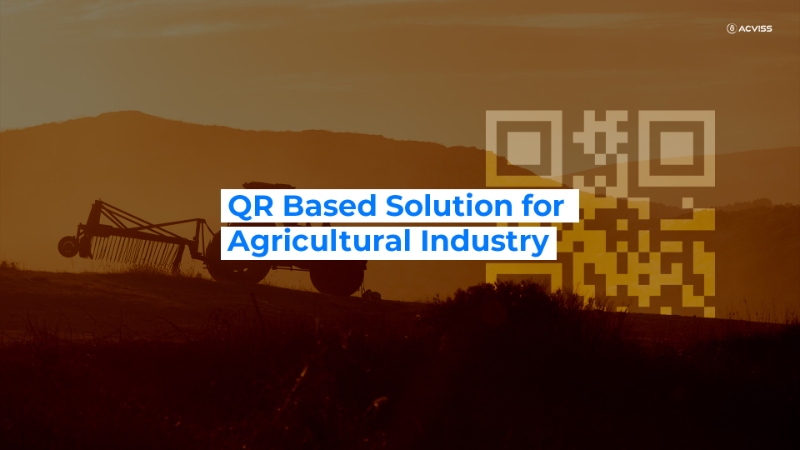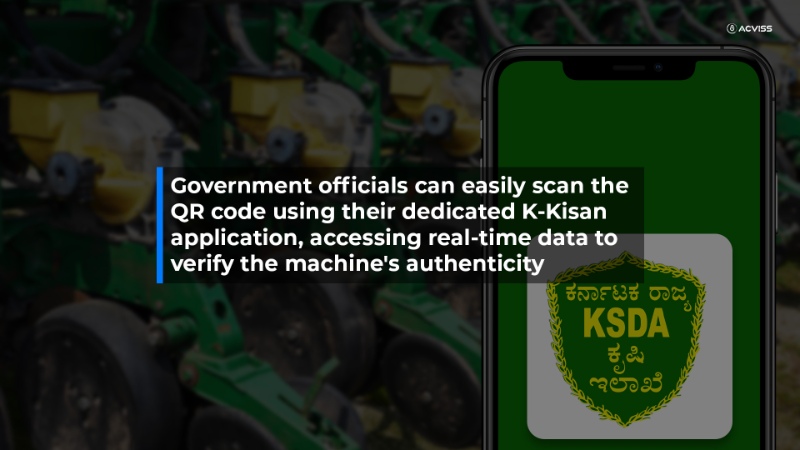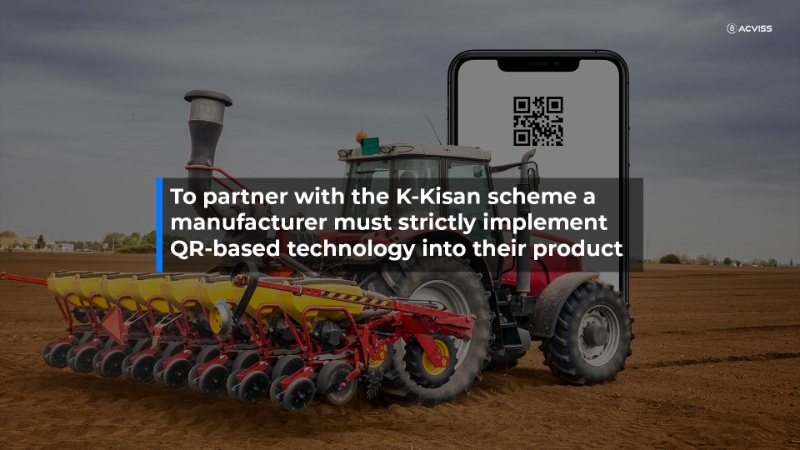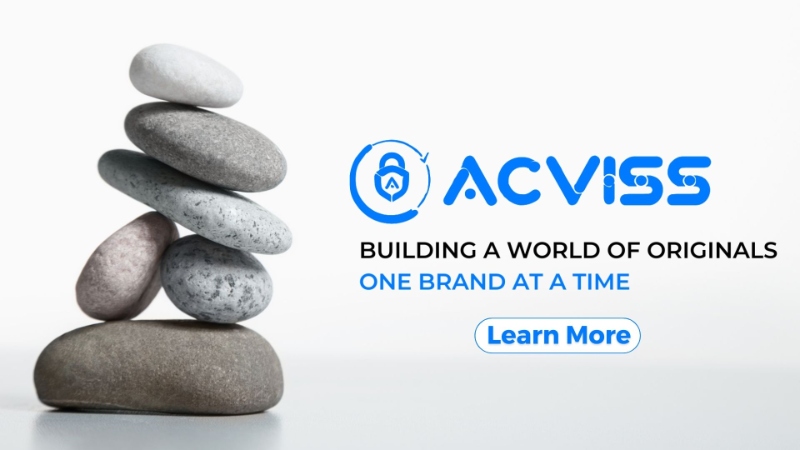How QR-Based Anti-Counterfeiting Empowers K-KISAN and the Indian Agri-Industry

The Indian agricultural sector, the backbone of our nation, is undergoing a transformative phase. However, the integration of machinery into farming practices plays a crucial role in this evolution. The Karnataka government launched the ambitious K-KISAN Farm Mechanization Scheme. The major objective is to provide agricultural machinery and input products to farmers at an affordable and subsidized price, to optimize resource utilization and secure the supply chain.
The success of the scheme was hindered by a growing menace; Counterfeiting. Over 30% of the agriculture input products in India are found to be counterfeits, which is expected to rise even higher shortly. To prevent that the government hinges on one crucial safeguard: QR-based authentication technology.
Contents
What is the K-Kisan Farm Mechanisation Scheme?
The K-Kisan Farm Mechanisation Scheme is a government initiative in Karnataka aimed at promoting the use of agricultural machinery among farmers. This aims to reduce drudgery and improve efficiency in farming practices increasing agricultural productivity and profitability. Along with the notion to make farming more attractive to younger generations creating employment opportunities in the rural sector. Till 2024, close to 7.9 lakh farmers have benefited from the scheme. A wide range of farm machinery is covered including:
- Land preparation equipment (tractors, tillers, etc.)
- Sowing/transplanting equipment
- Residue management equipment
- Plant protection equipment (sprayers, etc.)
- Diesel pump sets
- Harvesting and processing equipment
Why is Anti-Counterfeiting Crucial for K-KISAN?

Think about a farmer diligently saving, applying for a K-KISAN subsidy and finally purchasing a tractor they dreamt of. However, instead of receiving the genuine subsidized machine, they unknowingly end up with a counterfeit at market price. This not only deprives them of their rightful benefit but also jeopardizes their livelihood and trust in the scheme. This can lead to
- Financial losses for farmers as they pay market prices for substandard machinery, incurring significant financial strain.
- Ineffectiveness and safety hazards the counterfeit machinery lead to poor performance, breakdowns and potential accidents.
- Erosion of faith in the scheme undermines the integrity of K-KISAN, discouraging participation and hindering its objectives.
To avoid such mishaps, the Karnataka government along with the Department of Agriculture has made QR-based anti-counterfeiting technology mandatory for all K-KISAN machinery. Acting as a digital shield and source of product verification for government officials, protecting farmers and ensuring the scheme's effectiveness.
How QR-Based Technology Safeguards K-KISAN:
Unique, scannable QR codes are embedded in each agri-input product. These codes, linked to a central database, hold vital information including:
- Machine details: Manufacturer, model, specifications, manufacturing date etc.
- Subsidy information: Approved subsidy amount, beneficiary details, etc.
- Tracking data: Manufacturing, distribution and sale history.
Government officials can easily scan the QR code using their dedicated K-Kisan application, accessing real-time data for authenticity. Granting permission to vendors who present quality-assured products to enter the market.
The central database provides the government with real-time insights into the scheme's implementation. Facilitating trackingof equipment distribution, identifying irregularities and preventing misuse of subsidies. Along with building trust and accountability in the scheme's functioning and utilizing insights to improve policy formulation and scheme effectiveness.
Generate K-Kisan-approved QR labels for your products
How Should A Manufacturer Choose Their Anti-Counterfeiting Solution
To partner with the K-Kisan scheme a manufacturer must strictly implement QR-based technology into their product. However, having any QR code attached won’t work the magic. These labels should meet the following requirements.
- Non-clonable labels that are unique to each product unit, ensuring independent identity and doubled security.
- Scanned codes should direct users to a verified database providing transparency and traceability, resulting in a seamless authentication process.
- Encode crucial product information like manufacturer name, product type, batch number and manufacturing date, which are properly updated and verified.
- The QR code should be visible and within a designated size range, in the case of machinery or metal tools, the QR code is advised to be etched on the plate with high resolution for accurate scanning.
This raises the concern of investing in robust anti-counterfeiting solutions that integrate seamlessly with K-KISAN requirements. The non-cloneable unique holographic Uniqolabel by Acviss have protected over 2 billion products and farmers across the country from counterfeits. Several manufacturers partnered with K-KISAN are actively implementing Acviss solutions to ensure compliance and to position them as reliable partners in the scheme's success.

Beyond K-Kisan, a Step Towards the Bigger Picture
QR-based anti-counterfeiting in K-Kisan is just the first step. This technology holds immense potential for the entire industry including:
1. Protecting Intellectual Property: Seeds and fertilizers are the lifeblood of agriculture, and their intellectual property deserves protection. QR codes can be embedded into seed packets and fertiliser bags, providing irrefutable proof of authenticity and safeguarding valuable inventions from being copied.
2. Combating Food Adulteration: A growing concern, impacting consumer health and trust in the food supply chain. QR codes on food products can enable real-time tracking and verification, ensuring consumers get what they pay for and holding producers accountable for quality and safety.
3. Promoting Fair Trade: Empower farmers by providing transparency and traceability throughout the supply chain. This fosters fair trade practices, ensuring farmers receive fair compensation for their produce and consumers get ethically sourced products.
4. Building a Trustworthy Ecosystem: QR-based anti-counterfeiting can build a more trustworthy and resilient ecosystem. This benefits all stakeholders, from farmers and consumers to policymakers and businesses.
However, the building idea for utilising such technologies should boost farmer income, enhance export competitiveness and attract investments, ultimately nurturing a vibrant and trustworthy Indian agricultural ecosystem.
Want to know more about supply chain, transparency and brand protection? Head over to Acviss to learn more or get in Book a Demo with us to understand how we can get your supply chain secured.
